Photos by Weenta Girmay, owner and co-director at Weenta Productions. She has a sincere love for people and their stories, which is what inspires her to keep making new media.
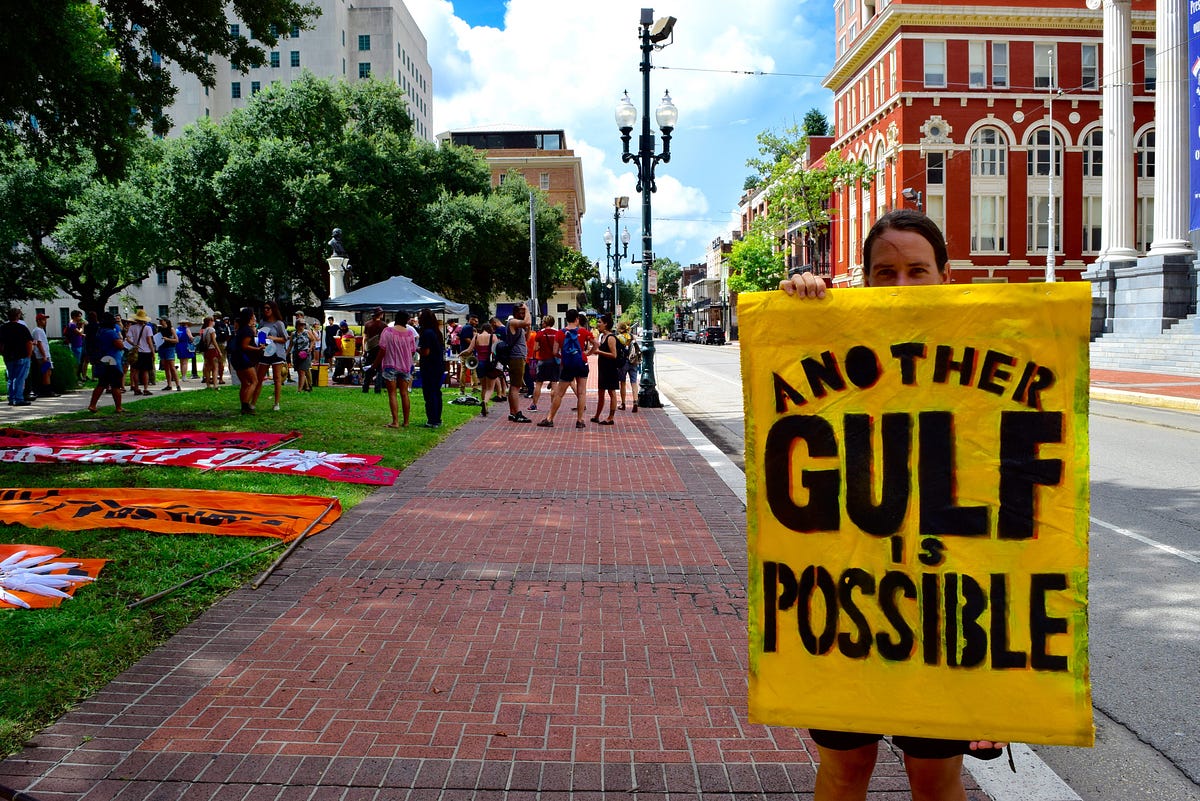
In the last two months, the Gulf South region of the US experienced an onslaught of the most devastating impacts of climate change and fossil fuel extraction.
#SouthLouisiana going under water #ClimateChanged #AnotherGulf pic.twitter.com/A7Knm3qPbV
— Cherri Foytlin (@CherriFoytlin1) August 13, 2016
Just a few weeks ago, the worst climate disaster since Hurricane Sandy hit Baton Rouge and the surrounding area, with major floods damaging more than an estimated 100,000 homes and displacing tens of thousands of people — South Louisiana residents are still dealing with the aftermath.
Before this catastrophic flooding took place, three different oil spills happened in southeast Louisiana within 10 days. There’s been a relentless assault on the Gulf South, fueled by the effects of oil and gas extraction.
Adding insult to injury, on August 24th the Obama administration planned to auction off a huge area of the Gulf of Mexico for offshore drilling.
The Gulf Coast has historically been seen as a sacrifice zone to so many destructive forces, from climate injustice to state violence to economic exploitation.
But from August 20th to 24th, Gulf South residents and allies in the US came together for a week of love, solidarity, and resistance for a vision of another Gulf — one where the Gulf is not a sacrifice zone.
This week of action kicked off August 20th, with an intersectional march organized by people from across the Gulf. The march brought together different movements to demand a just transition from unsustainable and extractive practices — from offshore drilling to police brutality and environmental racism to deportations and the unjust treatment of LGBTQ+ communities.
Gulf Coast residents and allies came together to say enough is enough: we demand justice and equity for every coastal community.
After experiencing the impact of the flooding near Baton Rouge firsthand, Cherri Foytlin, state director of BOLD Louisiana, started off the march by reminding us why we were there that day: to say that another Gulf is possible.
Movements were visually tied together at the march with brightly colored banners lined up one by one, representing the fights for justice taking place on the Gulf Coast.
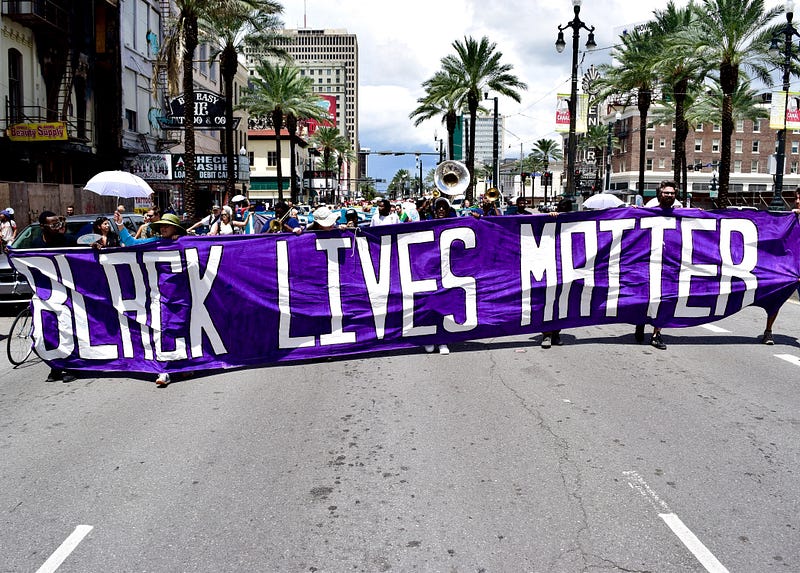
Black Lives Matter banner at the 8/20 March of Interdependence
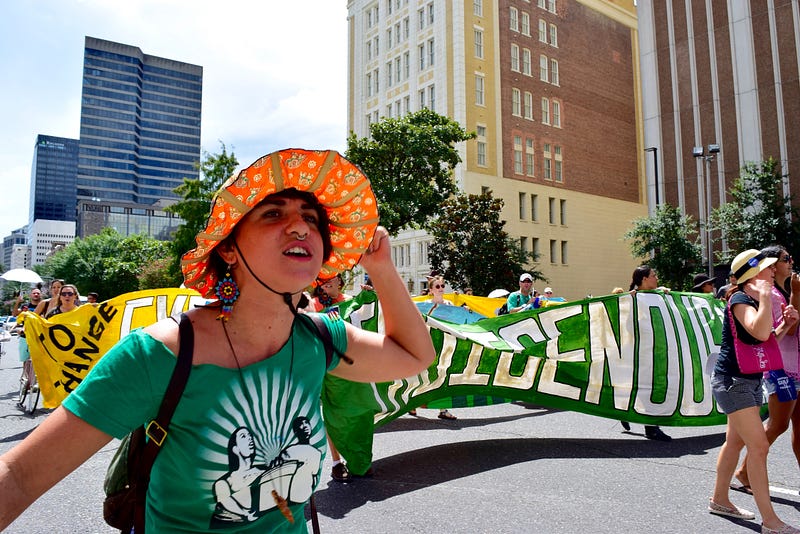
Anna Karina De Lage marching in front of the “Indigenous Rising” banner
Each stop made — at Shell headquarters, the ICE offices in New Orleans, and the white supremacist monument honoring the Battle of Liberty Place — wove together different movements across the region, highlighting how each fight is connected and reliant on each other.
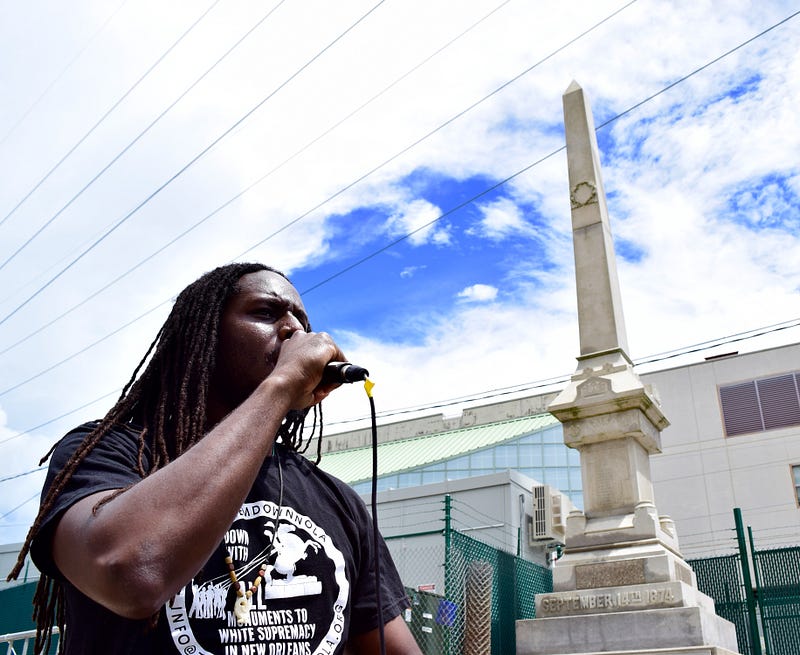
Spoken word artist Quess Moore with Take ’Em Down NOLA in front of the Battle of Liberty Place monument
The march closed out with a rally in front of Jackson Square followed by a water ceremony on the Mississippi River. Kandi Mosset, with Indigenous Environmental Network, came down from North Dakota’s Standing Rock Camp to lead the water ceremony with Monique Verdin of Louisiana and Cherri.
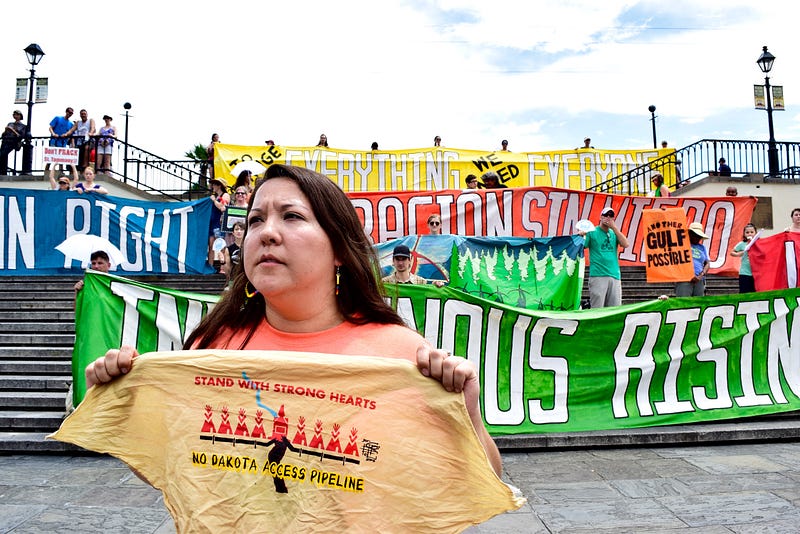
Kandi Mosset holding a #NoDAPL bandana in solidarity with the Gulf
Before the water ceremony, Kandi told the crowd how moved she was to be on the Gulf for this week of action, happening at the same time as the fight against the Dakota Access Pipeline in North Dakota.
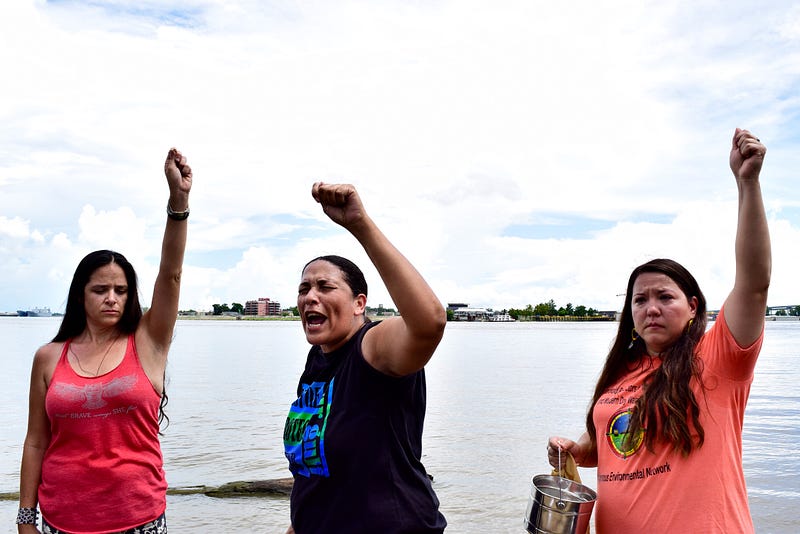
Monique Verdin, Cherri Foytlin, and Kandi Mosset leading the water ceremony on the Mississippi River
In the days following the march, two separate actions took place urging President Obama to stop the fossil fuel auction happening on August 24th. Almost 200,000 people signed a petition to cancel the auction and four people were arrested while peacefully attempting to deliver petitions to the Bureau of Ocean Energy Management the day before bids were sold.
Message to @POTUS: more drilling = more floods. Cancel tomorrow's fossil fuel auction in the Gulf. #NoNewLeases pic.twitter.com/7Q9JqXovT5
— 350 dot org (@350) August 23, 2016
Earlier this summer, BOEM officials closed offshore auctions to the public to prevent Gulf communities from openly protesting the auctions on site. On the day of the auction, after being barred entrance a group of Gulf residents demonstrated outside of the New Orleans Superdome, demanding that Abigail Hopper, director of BOEM, speak with them about ending offshore drilling in the Gulf of Mexico.
We need a just transition in the Gulf Coast. I’m here to welcome it, and my kids are going to be here to build it.
— Cherri Foytlin, BOLD Louisiana
Despite these two peaceful direct actions and almost 200,000 signatures to cancel the auction, the bids were sold — but they were historically low. While the auction may not have been canceled, the Obama administration was definitely paying attention.
This week of love and solidarity across movements on the Gulf Coast is a testament to the growing resistance of coastal communities, and shows that another Gulf is possible.
Gulf residents demand #NoNewLeases #AnotherGulf in protest of lease sale at Superdome for new offshore oil drilling. pic.twitter.com/6of3UvEF6k
— Antonia Juhasz (@AntoniaJuhasz) August 24, 2016
However, our work is far from over. On September 20th, the Obama administration will hold the first online fossil fuel auction, selling off more public lands and waters to the fossil fuel industry.
The Obama administration can’t continue to sell off Gulf waters to the highest bidder, especially while so many in Louisiana are still dealing with the aftermath of climate-fueled flooding. Tell President Obama to cancel the next fossil fuel auction in the Gulf — our coastal communities can’t afford it.
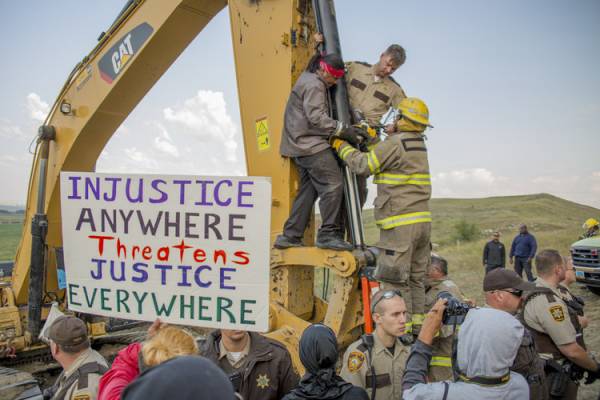
Non-violent direct action by Iyuskin American Horse of the Sicangu Lakota, stopping construction on the DAPL. Photo by Justin Deegan
As our movement grows, we need to support and connect fights against fossil fuel infrastructure, from offshore drilling in the Gulf Coast to the Dakota Access Pipeline in North Dakota.
To continue standing strong against the DAPL, Sacred Stone Camp needs our support: donate here for necessary supplies like food, water, and propane.
If we support each other in our connected fights, we know we can win.